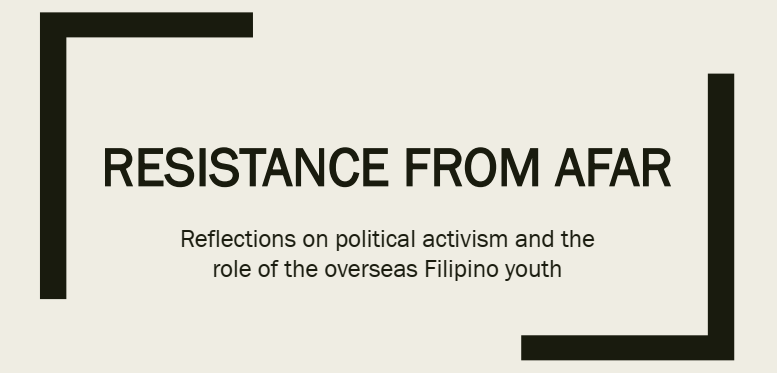This piece is based on the talk “Resistance from afar: Reflections on political activism and the role of the overseas Filipino youth” held at the University of Vienna on 8 June 2018, organized by Sentro and supported by the Institute of Geography and Regional Research.
Rodrigo Duterte’s presidential election victory in 2016 was a catalyst for my critical political engagement with the most pressing issues facing Philippine society. While his reign as chief executive has reached its two-year mark, he has already leaving behind a legacy of tragedy and atrocity.
One of them is his “war” on drugs, which has basically been an extrajudicial killing and social cleansing campaign that has taken over 23,000 lives. This crackdown on the defenseless and marginalized has recently included rights activists and democratic institutions as seen from recent reports and the recent ouster of the country’s Chief Justice of the Supreme Court.
Furthermore, one-third of the country is currently still under martial law despite the lack of an ongoing menacing rebellion in Mindanao. The Battle of Marawi, which lasted five months killing dozens and displacing over a million people, is over, yet military rule still prevails.
But despite these challenges, the current conjuncture poses prospects for some hope. The government’s popularity rate, while high, is in decline and the lack of an organized mass base capable of going beyond the toxic social media echo chamber seems to be evident.
Frontline Struggles
But there is indeed a growing opposition and a rising resistance as I’ve written in an article for Waging Nonviolence. But it has so far been stuck in building a united front with a strong visionary program offering a progressive alternative.
My inspiration for writing that piece was based on my last trip to the Philippines in August 2017. That month reached a turning point for Duterte’s regime when the nation witnessed the horrific murders of young students committed by the police. One brutal assassination – that of Kian Delos Santos – was caught on video, which emotionally exposed the barbarity of the “drug war” in a way that painstaking documentation from the media and human rights groups had not yet achieved. The teenager’s death sparked popular fury and the emergence of new grassroots alliances against the government.
One of the first major protest actions that month was the #StopTheKillings indignation rally a few days after Kian’s death. I brought an Austrian friend with me that afternoon. A fellow student-activist as well, he emphasized the essential power of emotions in the protests and remarked how the threats and issues there are more real and more imminent compared to the ones in Europe. Indeed, mobilizing in the Philippines is hard, considering it is one of the world’s most dangerous countries for rights activists and other critical voices.
Another experience I undertook was a spontaneous rally for Reynaldo de Guzman, another student killed in cold blood by law enforcement authorities. We staged a protest action before the Philippine National Police’s Camp Crame headquarters in Quezon City. At that same day, symbolized by the idea that all struggles against the government are connected, we were greeted by militant indigenous rights activists protesting martial law in Mindanao and increasing militarization and oppression rampant in rural areas (the Armed Forces of the Philippines’ Camp Aguinaldo headquarters was just across Camp Crame).
Another notable demonstration was an anti-Marcos rally organized by Block Marcos at the heroes’ cemetery (Libingan ng mga Bayani). That day, loyalists and cronies commemorated the late dictator’s 100th birthday. It was an event unsurprisingly tolerated by the president, who has shown no shame in his role of rehabilitating the Marcos dynasty’s criminal and corrupt legacy. Though it was a small protest attended by no less than a dozen people, it nevertheless highlighted the significance of memory and its role in politics – of learning from history.
The Engaged Youth
The Philippines has a vibrant youth and student movement. One of the best and earlier examples of this is the First Quarter Storm in 1970 that followed the legacy of the 1968 revolts in Europe. It was a series of demonstrations led by a freshly radicalized youth movement and ignited a stormy impact on the aspiring authoritarian Marcos government, which led to the eventual nationwide declaration of martial law in 1972. They, along with the urban poor, working classes and other marginalized sector of Philippine society, led the mass protests against rampant corruption and inequality.
Now, over thirty years after ousting Ferdinand Marcos, we are witnessing yet again another growing radicalization of the youth as seen from the nationwide walkout marches in schools and universities earlier this year in February 2018, where thousands of students critical of the Duterte regime took to the streets to protest against the government’s regressive and repressive policies of terror and tyranny. This is a sign of hope.
The Role of the Diaspora
I’ve been politically active even before Duterte’s electoral victory, having been involved in a few progressive youth movements and organizations here in Austria and Europe. All struggles are connected, especially in this globalized world. And in the West, where democratic values and the fundamental rights to speak and protest are sometimes taken for granted, the role of immigrant communities, especially those coming from the Global South where democracies are fragile, should be to expose these trends of injustices.
In a recent demonstration at the Philippine Embassy in Brussels, a colleague Asher Serrana echoed the rallying call of advocates back home – “Activism is not a crime.” When dissent is criminalized, it is only a matter of time before all other rights we take for granted follow. Similarly, it is also worth noting this statement by Christopher Chanco, a Toronto-based colleague, in which he emphasized that “Filipinos in the diaspora have a double obligation to defend human rights and democracy, both in the Philippines and wherever we find ourselves living.”
Christopher and I are active with the Alitaptap Collective, a network of overseas Filipino scholars researching and writing on the issues and crises facing the Philippines. From the Collective’s vision statement, we reflect on our privileged lives abroad away from the crises at home and realize that being far away should not be a deterrent when it comes to taking action: “We take courage to act, incisively, and in ways that we are in a unique position to do. While we live and work abroad, we keep our eyes, minds and hearts attuned to what is happening in the Philippines. We realize that our distance should not deter us from action; that, as with our access to academic resources and vantage points, and even the security our locations afford us, we should see it as a strength unique to our privileged position.”
Let’s just hope that we can turn this strength into something more. Another thing worth noting is that despite the efforts of my politically active colleagues, who are mostly first generation-immigrants, I believe that we should also make an effort in including those from the second-generation; people struggling with two identities and who are still close to the diaspora whose roots they’ve yet to embrace, understand and comprehend. We have a long way to go.
Presentation:
Joshua Makalintal
Joshua Makalintal has lived in Austria for almost 9 years after immigrating from the Philippines and is currently taking political science at the University of Innsbruck.
He is active with the Alitaptap Collective, a network of overseas Filipino scholars and students who believe in the importance of mobilizing critical public scholarship on the Philippines through non-academic platforms and in support of grassroots organizing efforts.



